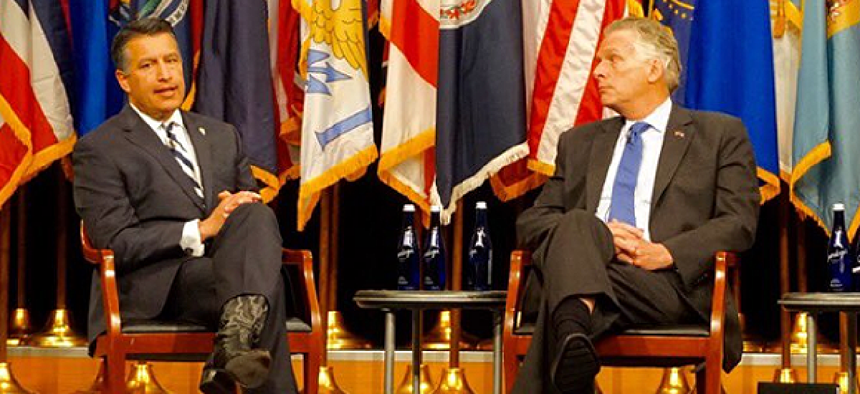Governors put cybersecurity, broadband on front burner


Connecting state and local government leaders
At the National Governors Association winter meeting, Govs. Terry McAuliffe and Brian Sandoval both spoke about opportunities for the federal and state governments to work together and across the aisle.
Improving cybersecurity and broadband within rural communities are among the policy priorities of the nation’s governors.
At the Jan. 25 winter meeting of the National Governors Association, Govs. Terry McAuliffe (D-Va.) and Brian Sandoval (R-Nev.) stated that cybersecurity gives states a chance to work closely with the federal government and across party lines.
“In order to be successful at thwarting threats, the federal government must view states as primary sources of intelligence, as well as priority recipients of intelligence from the federal government,” said Sandoval, who is NGA vice chair. “States should be seen as full-fledged partners in gathering, analyzing and disseminating intelligence in the fight against cyber terrorism.”
NGA Chair McAuliffe mentioned in his address that Virginia faces about 70 million cyber attacks a year, about four a second. Across the country these attacks cost the United States $300 million annually, he said.
After the event, McAuliffe said he is hopeful in what he has seen from Gen. John F. Kelly, President Donald Trump’s pick to head the Department of Homeland Security, on the issue of cybersecurity.
“I do think we have broad, bipartisan agreement” on cybersecurity, McAuliffe told GCN.
He added that by the end of his tenure heading NGA he wants all 50 states to have signed on to follow basic security framework protections.
Both governors also spoke about infrastructure. NGA has placed it as one of the top three priorities for the new administration; health care reform and tax reform round out the top three.
Doug Robinson, the executive director of the National Association of State Chief information Officers, has spoken about the potential for the infrastructure spending being floated by the Trump administration to include upgrades to legacy IT systems.
Sandoval and McAuliffe said they both supported broad interpretations of the term “infrastructure.” McAuliffe said he supported a more expansive definition of infrastructure “if it increases capacity for a state to grow exponentially, to help economically and is in the best interest of the United States of America.”
Improving broadband in Nevada is a spot that Sandoval sees as an opportunity for federal infrastructure spending. According to a study by Education Superhighway, Nevada ranks 45th in the percentage of school districts meeting 100 kbps per student minimum goal, though it ranked 4th among states with the most-improved school connectivity.
Many communities still struggle with gaps in broadband coverage. The Broadband Opportunity Council, which met for the final time under the Obama administration in November, released its final report this month.
“Expanding access and adoption of broadband is critical to America’s economic growth and prosperity,” the report concluded. “The broadband interagency working group looks forward to continuing to work on the important task of ensuring that all Americans have access to the broadband resources they need to participate fully in the digital economy to ensure that no American is left behind.”
When asked about President Trump’s call for an investigation into the possibility of voter fraud having taken place in the November election, Although some state election systems were targeted by hackers in the months leading up to Election Day, Sandoval said there was no evidence of voter fraud in his state. McAuliffe said these allegations were “made up” and said politicians had more important issues to focus on.




